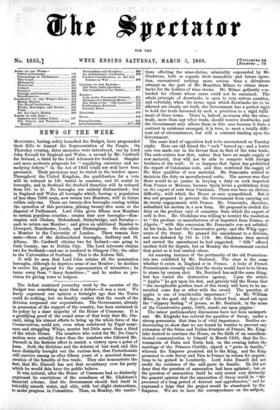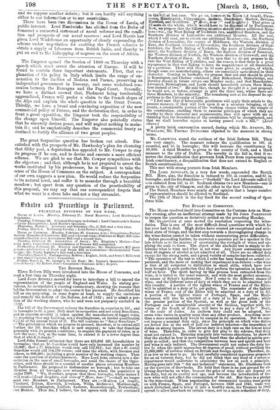The defeat sustained yesterday week by the enemies of the
Budget was something more than a defeat—it was a rout. We
freely expressed our opinion a fortnight ago that the Tories could do nothing, but we frankly confess that the result of the division surpassed our expectations. The Government, already in possession of the support of the country, has been sustained in its policy by a clear majority of the House of Commons. It is a gratifying proof of the sound sense of that body that Mr. Dis- raeli, using his utmost efforts to bring up the whole force of the Conservatives, could. not, even when reinforced by Papal nomi- nees and straggling Whigs, muster but little more than a third of the whole House. The numbers who voted for Mr. Du Cane's motion were actually fewer than the numbers who followed Mr. Disraeli in his factious effort to snatch a victory upon a point of form. Both the divisions and the debates of last week and this have distinctly brought out the curious fact, that Protectionists still survive among us after fifteen years of a practical demon- stration of the benefits of free trade. They also demonstrate the fact, that Mr. Disraeli has not that as,.:endancy over his party which he would fain have the public believe. It was natural, after the House of Commons had so distinctly expressed its convictions of the soundness of Mr. Gladstone's financial scheme, that the Government should find itself in tolerably smooth water, and able, with but slight obstructions, to make progress in Committee. Thus, on Monday, the resolu- tions affecting the wine-duties, admirably expounded by Mr. Gladstone, both as regards their immediate and future opera- tion, encountered nothing more serious than a chivalrous attempt on the part of Mr. Monckton Mikes to obtain draw- backs for the holders of wine stocks. Mr. Mines gallantly con- tended for clients whose cause could not be sustained. The whole principle of drawbacks is open to very serious question, and certainly, when the terms upon which drawbacks are to be allowed are clearly set forth, the Government has a perfect right to hold the trade favoured by such a provision to a rigid fulfil- ment of those terms. There is, indeed, no reason why the wine- trade, more than any other trade, should receive drawbacks, and the Government only allows them in this case because it finds a contract in existence arranged, it is true, to meet a totally diffe- rent set of circumstances, but still a contract binding upon the Government..
The same kind of opposition had. to be encountered on Tuesday night. Here our old friend the " cork " turned up ; and a better ease was made out in his favour than in that of the wine trade. The cork-cutters fear that, unless they have an ample supply of raw material, they will not be able to compete with foreign brethren of the craft. It so happens that Spain has prohibited the export of Catalonian cork, and thus restricted the supply of The finer qualities of raw material. Mr. Duncombe wished to hiaintain the duty on manufactured corks. The answer was that there would be no justice in levying a duty on cork imported. from France or Morocco, because Spain levies a prohibitory duty on the export of cork from Catalonia. There was here an obvious difficulty, with which the House at once sympathized. But it *as not prepared to prevent the Government from carrying out its treaty engagements with France. Mr. Duncombe, therefore, submitted his motion in a new form. He proposed to abolish the duty on the produce only of countries from which the export of cork is free. Mr. Gladstone was willing to restrict the resolution to " the produce or manufactures of or imported from France, or Algeria : " with this concession Mr. Duncombe was not satisfied. At his back, he had the Conservative party, and the Whig oppo- nents of the treaty. He pressed his amendment to a division and was defeated by 191 to 118. Mr. Gladstone then move and carried the amendment he had suggested. " Silk " offered another field for dispute, but on Monday the Government carried that point as it had carried others.
An amusing instance of the pertinacity of the old Protection- ists was exhibited. by Mr. Bentinck. The class is the same whether it exists in England or in France. A body of French Protectionists recently said that the treaty would have to be blown to atoms by cannon shot. Mr. Bentinck has said the same thing, but has varied the destructive agency. Upon the article " Apples " he got upon his feet, and gravely told the House that "the inexplicable gordian knot of this treaty will have to be un- ravelled some day or other with the sword. The question of apples is one of considerable importance ! " As Mr. William Miles, in the good old days of Sir Robert Peel, stood out upon the "slippery footing" of grease, so Mr. Bentinok, in the name of the Conservative party, 1860, stands out upon pippins !
The minor parliamentary discussions have not been unimport- ant. Mr. Kinglake has revived the question of Savoy, under a strong persuasion that time is of vital importance. Besides en- deavouring to show that we are bound by treaties to prevent any extension of the Swiss and Italian frontiers of France, Mr. King- lake desired to convince the House, on the faith of an unauthen- ticated communication to himself in March 1859, that the Go- vernments of Paris and Turin had, on the evening before the marriage of the Princess Clotilde, signed a " paote de famine " wherein the Emperor promised aid to the King, and. the King promised to cede Savoy and Nice to France in return for acquisi- tions to be gained in Lombardy. Lord John Russell did not credit the existence of the said pacte de famill' e. He did not deny that the question of annexation had been agitated ; but on the question of annexation itself he only stated very distinctly the general opinion that the annexation of Savoy would be "the precursor of a long period of distrust and apprehension," and he expressed a hope that the project would be abandoned by the Emperor. We are to have the correspondence on the subject,
and we suppose another debate ; but it can hardly add anything either to our information or to our convictions.
There have been two discussions in the House of Lord; of public interest. Lord Hazdwieke has elicited from the Duke of Somerset a connected statement of naval reforms and the condi- tion and prospects of our naval reserves : and Lord Harris has given Lord Wodehouse an opportunity of clearly expounding the scheme under negotiation for enabling the French colonies to obtain a supply of labourers from British India, and thereby to put an end to the kidnapping of negroes on the coast of Africa.



























 Previous page
Previous page